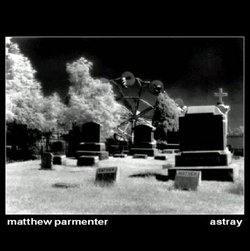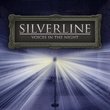| All Artists: Matthew Parmenter Title: astray Members Wishing: 1 Total Copies: 0 Label: Strung Out Records Original Release Date: 4/15/2004 Release Date: 4/15/2004 Genres: Alternative Rock, Classic Rock Style: Psychedelic Rock Number of Discs: 1 SwapaCD Credits: 1 UPC: 762225680428 |
Search - Matthew Parmenter :: astray
 | Matthew Parmenter astray Genres: Alternative Rock, Classic Rock
The 68-minute CD features all new tracks including the 21-minute song suite Modern Times. Produced and engineered by Parmenter, astray is decidedly psychedelic in atmosphere. Songs unfold into dreamlike improvisations t... more » |
Larger Image |
CD DetailsSynopsis
Product Description The 68-minute CD features all new tracks including the 21-minute song suite Modern Times. Produced and engineered by Parmenter, astray is decidedly psychedelic in atmosphere. Songs unfold into dreamlike improvisations that surround the listener. Bassist Mathew Kennedy appears throughout the CD, the sole guest musician on astray. Parmenter covers vocals and other audibles, including piano, guitar, drums, saxophone, violin, organ, synthesizers, marimba, Theremin, and Mellotron sounds. Similar CDs
|
CD ReviewsA Flawed Candle in the Darkness Jeff Hodges | Denton, TX United States | 12/19/2006 (3 out of 5 stars) "While I was not always in the mood for it, I was a fan of Discipline's particularly dreary brand of progressive rock in the late 90's. If I was feeling a little introverted and evil, and after "The Downward Spiral" was worn out, "Unfolded Like Staircase" certainly met my needs. While not nearly as acerbic as Reznor, Parmenter's unique and passionate voice delivered a certain psychotic prog intellectualism that I was getting in touch with, and I developed a respect for his work. As a result, I chose to purchase "Astray" at the same time as Neal Morse's "One." I thought that "Astray" may act as a compelling foil to Morse's increasingly Christian (but still well-written) viewpoint. After all, both Parmenter and Morse have some interesting similarities as talented, charismatic, and possibly overbearing conceptualists (for entirely different reasons). While "Astray" does not come close to exhibiting the compositional strength that Morse seems to just sweat, it is a decent listen. Parmenter has a knack for brooding, menacing atmospheres, and his thinly drawn line between confession and self-deprecation would most likely appeal to die-hard fans of old-school Fish-led Marillion, in the vein of "Fugazi." While Parmenter's approach may not be as poetic or aloof as Fish's, his tendency to shine a flashlight on uncomfortable aspects of himself is simultaneously disquieting and cathartic in a way that teeters on Goth. Rather than a poet, Parmenter's approach is more that of a storyteller, which is both a boon and a bane. He takes considerable care to imbue his lyrics with a dramatic plot that climaxes effectively like a short story, but his desire to lead the listener through his lyrical ideas sometimes results in overlong and periocially muddy arrangements. There are several tunes on "Astray" that pass the seven-minute mark that probably could end at five (see "Dirty Mind"), but are extended for the sake of the text. However, the hooky nature and well-considered atmosphere of these songs make this aspect of "Astray" less irritating than it sounds, especially if you are a fan of lyrics. Parmenter also proves to have significant talents as a multi-instrumentalist. On "Astray," if we are to believe his credits, he plays all instruments besides bass. If this is the case, a focused listen will reveal his significant facility on sax, piano, cello, drums, and guitar. However, of all of these it is the latter that is the least convincing. Sonically, "Astray" is a mere two or three steps away from early Pink Floyd and Peter Gabriel, largely due to the dark ambiance and introverted text. I can't help but think that if he had outsourced his guitar work that the tunes would open up to a higher level of instrumental intensity. The Lowdown: "Astray" probably sounds best if you are driving alone in the rain. It's gloomy and sometimes overlong prog, but within the mire there are overtones of self-revelation. Fans of thoughtful and occasionally clever lyrics in this setting could certainly do much worse." Best of 2004? Could very well be. Don't go astray... Try it. Dan A. Bobrowski | California | 01/12/2005 (4 out of 5 stars) "Many influences abound on Matthew Parmenter's first solo release. The Genesis school of theatrical music, VDGG's pain and anguish (Parmenter occassionally sounds very much like Peter Hammill) and early King Crimson's aural soundscape (heavily mellotronised) and even a glimpse or two of Jon Anderson styled lyric lines (in my head I could hear Anderson singing some of the vocals. Not timbre, mind you, more inflection). All in all, a healthy prog soup. Except for the bass, all instruments are played by Parmenter. Drums, percussion, vocals, keyboards, violin, sax, guitar... It has such a live feel, it's hard to believe everything is totally overdubbed. Each instrument is played with finesse and the conviction one puts into being adept at only a single instrument. This guy could be a member in any band. Versatility is an understatement. This album is a grower, each listen (about 15 for me) brings forth new elements and wonders. By the third or fouth listen, I was captured. Vocally, Parmenter can be a chameleon. He changes styles and tones in an instant. From Hammill's melodrama to Anderson's wispy naivete to Gabriel's storytelling characters. Personally, I would be appreciative if he dropped the Hammill persona. It comes across as almost too imitative, rather than personal. I researched other sites regarding this release and some even credit Hammill as singing on this record. Believe me, Hammill''s name does not appear on the CD sleeve, nor on the MP website. Strange? I'll say. Discipline's last studio release, Unfolded Like Staircase features some Hamillesque vocals as well. Musically, Astray doesn't get as heavy as the Discipline albums. There are many softer interludes and rarely do the tune reach any climatic cresendoes. The music lilts and flows. It will not lull you, however, it's piques your interest and carries you along. This is what progressive music should do. This is visual art for the mind. It's not always pretty, but it screams to been seen. High points? The longest track, "Modern Times" has many movements, plenty of mellotron and some King Crimson power chording and eclectic themes. Over twenty minutes of shifting textures, martial beats, apocalyptical lyrics and a stunning guitar solo finale. "Dirty Mind" features wonderfully irreverent lyrcis and a playful piano accompaniment. "All my thoughts turn to dirty thoughts." Wickedly fun. "Distracted" gives me the Jon Anderson image. Too bad YES doesn't get this charged lyrically anymore. "Now" has a heavy Hammill vibe in the lyrics and delivery. It's a strong disc. There is a lot to absorb and many sights to see and hear within the music. Just like the old Ragu commercials, "Try It, You'll Like IT."" Dark, Deep, and Thick with Clouds indeed Murat Batmaz | Istanbul, Turkey | 12/22/2004 (4 out of 5 stars) "As the Amazon description reveals, Matthew Parmenter's first solo album Astray is the ultimate melting pot of dark, deep and heavily introspective songwriting. Parmenter is American underground prog band Discipline's frontman, but Discipline hasn't released any albums since 1997 if I'm not mistaken. I was rather surprised to find out Parmenter had returned with a brooding solo offering titled Astray, which proves to be a significant improvement in many ways. Not only that, but it is also a true 'solo' album in the way that Matthew Parmenter basically plays every instrument except the bass. He sings, plays the piano, guitar, drums, saxophone, violin, organ, synths, mellotron and a number of other instruments. His Discipline bandmate Matthew Kennedy accompanies him with his subtle bass lines. Parmenter recorded, mixed, produced and engineered Astral as well. The outcome is brilliant and his diversity has to be respected. From what I know, the only other artist who has played every instrument on a solo album is Dan Swano on his Moontower record (though the two musicians play quite a different style of prog).
"Now" welcomes the listener with a strangely beautiful piano melody that creeps into the song mixing with jazzy drumming. Parmenter's drum work is nothing short of brilliant. The way he plays with the cymbals and gives more emphasis on content rather than technique is nicely displayed here. His singing seems different; more mature in a way. There is a distinct Peter Hamill feel to be found but the music is more in the league of Gabriel-era Genesis. Brief guitar lines run underneath the dark atmosphere of the song with fat, pulsing bass throbs. All these overlapped instruments are blended to give the mosaic of "Now" its final character. I had to hear this track five times in a row before I could move on to the next song, and I must say it's still my favourite on the CD along with the 21-minute "Modern Times". The momentum is reduced as "Distracted" and "Dirty Mind" work their way through the clutter of the record. More jazz piano and an improvised instrumental section become the focal point of the songs displaying a varied complexity throughout the music. I am strangely reminded of another indie band, maudlin of the Well, while listening to parts of Astray. It must be the way the classical formation is amalgamated with free-style jazz. No one else may agree about this comparison though. The guitar work on "Dirty Mind" is very bluesy in context and it works impeccably. A tired organ opens "Another Vision" with blurry drumming in the far edge of the mix. Parmenter's fragile vocals are delicately layered over the composition and all you have to do is close your eyes and be drawn by the intensity of his singing. By the time the song reaches its finale, you are fully convinced that Parmenter has certainly entered a realm of maturity. This is progressive music gone dark, without relying on the 'neo' tag as the music presented here sounds surprisingly fresh despite being 70's inspired. The protagonist in "Some Fear Growing Old" invites the listener to enter his mind for a moment to observe his inner conflicts about getting old. The opaque acoustic guitar complements the gloom leaving its place for a sad violin piece towards the end. Matthew Parmenter guested on Tiles' two albums before playing violin, but it sounds totally different here. "Between Me and the End" features keys and guitars sparkling without being uplifting. This song is blessed with a truly standout performance. Parmenter's singing becomes even more haunting here. The album closer "Modern Times" is easily the climax of the whole record. It kicks in with a slow, dragging and morose melody. Suddenly, 7 minutes into the song, the song explodes into a funk-driven post-psychedelia heavily centred on the bass guitar. Actually on each song, there is a moment where each instrument is pushed forward so it can shine through and add to the composition, but the bass is simply phenomenal. It drives the song forward, carries it, and never fails to add to the sinister mood. Parmenter continues to generate fresh ideas on the guitar with picking style on acoustic and electric respectively. There is even a brief synth solo at the end which oddly fits in nicely. The writing is cohesive, structured, but by no means forced. A very good ending to a very good record indeed. The booklet, packaging, lyrics and artwork are a great representation of the music this album contains. Every Progressive Rock fan needs to hear this." |

 Track Listings (7) - Disc #1
Track Listings (7) - Disc #1

